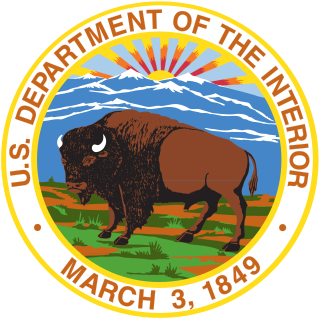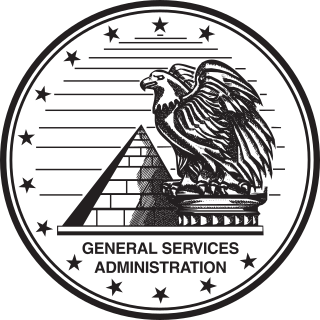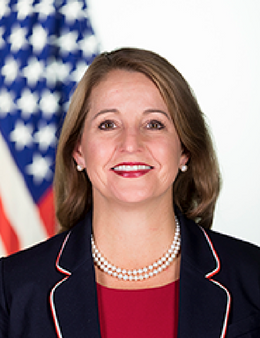Related Research Articles

The Office of Management and Budget (OMB) is the largest office within the Executive Office of the President of the United States (EOP). OMB's most prominent function is to produce the president's budget, but it also examines agency programs, policies, and procedures to see whether they comply with the president's policies and coordinates inter-agency policy initiatives.

The Department of the Treasury (USDT) is the national treasury and finance department of the federal government of the United States, where it serves as an executive department. The department oversees the Bureau of Engraving and Printing and the U.S. Mint. These two agencies are responsible for printing all paper currency and minting coins, while the treasury executes currency circulation in the domestic fiscal system. The USDT collects all federal taxes through the Internal Revenue Service; manages U.S. government debt instruments; licenses and supervises banks and thrift institutions; and advises the legislative and executive branches on matters of fiscal policy. The department is administered by the secretary of the treasury, who is a member of the Cabinet. The treasurer of the United States has limited statutory duties, but advises the Secretary on various matters such as coinage and currency production. Signatures of both officials appear on all Federal Reserve notes.

The United States Department of the Interior (DOI) is an executive department of the U.S. federal government responsible for the management and conservation of most federal lands and natural resources. It also administers programs relating to Native Americans, Alaska Natives, Native Hawaiians, territorial affairs, and insular areas of the United States, as well as programs related to historic preservation. About 75% of federal public land is managed by the department, with most of the remainder managed by the Department of Agriculture's Forest Service. The department was created on March 3, 1849. It is headquartered at the Main Interior Building, located at 1849 C Street NW in Washington, D.C.
The United States Government Publishing Office is an agency of the legislative branch of the United States Federal government. The office produces and distributes information products and services for all three branches of the Federal Government, including U.S. passports for the Department of State as well as the official publications of the Supreme Court, the Congress, the Executive Office of the President, executive departments, and independent agencies.

The General Services Administration (GSA) is an independent agency of the United States government established in 1949 to help manage and support the basic functioning of federal agencies. GSA supplies products and communications for U.S. government offices, provides transportation and office space to federal employees, and develops government-wide cost-minimizing policies and other management tasks.

United States Customs and Border Protection (CBP) is the largest federal law enforcement agency of the United States Department of Homeland Security. It is the country's primary border control organization, charged with regulating and facilitating international trade, collecting import duties, as well as enforcing U.S. regulations, including trade, customs and immigration. CBP is one of the largest law enforcement agencies in the United States. It has a workforce of more than 45,600 federal agents and officers. It is headquartered in Washington, D.C.

The E-Government Act of 2002, is a United States statute enacted on 17 December 2002, with an effective date for most provisions of 17 April 2003. Its stated purpose is to improve the management and promotion of electronic government services and processes by establishing a Federal Chief Information Officer within the Office of Management and Budget, and by establishing a framework of measures that require using Internet-based information technology to improve citizen access to government information and services, and for other purposes.
Executive Schedule is the system of salaries given to the highest-ranked appointed officials in the executive branch of the U.S. government. The president of the United States appoints individuals to these positions, most with the advice and consent of the United States Senate. They include members of the president's Cabinet, several top-ranking officials of each executive department, the directors of some of the more prominent departmental and independent agencies, and several members of the Executive Office of the President.

Vivek Kundra is a former American administrator who served as the first chief information officer of the United States from March, 2009 to August, 2011 under President Barack Obama. He is currently the chief operating officer at Sprinklr, a provider of enterprise customer experience management software based in NYC. He was previously a visiting Fellow at Harvard University.

Data.gov is a U.S. Government website launched in late May 2009 by the Federal Chief Information Officer (CIO) of the United States, Vivek Kundra. Data.gov aims to improve public access to high value, machine-readable datasets generated by the Executive Branch of the Federal Government. The site is a repository for Federal, state, local, and tribal government information made available to the public.
The United States Chief Technology Officer is an official in the Office of Science and Technology Policy. The U.S. CTO helps the President and their team harness the power of technology and data to benefit all Americans. The CTO works closely with others both across and outside government on a broad range of work including bringing technology expertise to bear on federal policy and programs, and promoting values-driven technological innovation. The CTO and their team have historically focused on leveraging technology and technical expertise to help create jobs, strengthen privacy protections, harness the benefits and mitigate the risks of artificial intelligence, create paths to improve government services with lower costs, higher quality and increased transparency and accessibility, help upgrade agencies to use open data and expand their data science capabilities, improve quality and reduce the costs of health care and criminal justice, increase access to broadband, bring technical talent into government for policy and modern operations input, improve community innovation engagement by agencies working on local challenges, and help keep the nation secure.

The federal Chief Information Officer of the United States, also known as the United States Chief Information Officer, is the administrator of the Office of Electronic Government, or the Office of the Federal CIO (OFCIO), which is part of the Office of Management and Budget. The President appoints the Federal CIO. The appointee does not require Senate confirmation. It was created by the E-Government Act of 2002.

Beth Simone Noveck is the 1st Chief Innovation Officer of New Jersey, Director of the Burnes Center for Social Change at Northeastern University, and Director of The Governance Lab. She is also affiliated faculty with the Institute for Experiential AI. She is the author of Solving Public Problems: How to Fix our Government and Change Our World, Smart Citizens, Smarter State: The Technologies of Expertise and the Future of Government, Wiki Government: How Technology Can Make Government Better, Democracy Stronger, and Citizens More Powerful, and co-editor of the State of Play: Law and Virtual Worlds.

Steven VanRoekel was named the Office of Management and Budget's Acting Deputy Director for Management on May 21, 2013. He was also the second Federal Chief Information Officer of the United States and previously worked for the Federal Communications Commission, the United States Agency for International Development, and at Microsoft.

The Presidential Innovation Fellows program is a competitive fellowship program that pairs top innovators from the private sector, non-profits, and academia with top innovators in government to collaborate on solutions that aim to deliver significant results in months, not years. It was established in 2012 and has operated continuously since then. The program focuses on generating measurable results, using innovation techniques from private industry such as Lean Startup, Design Thinking, and Agile Development.

The Federal Information Technology Acquisition Reform Act made changes to the ways the U.S. federal government buys and manages computer technology. It became law as a part of the National Defense Authorization Act for Fiscal Year 2015 (Title VIII, Subtitle D, H.R. 3979.
Open data in the United States refers to the Federal government of the United States' perspectives, policies, and practices regarding open data.

The United States Digital Service is a technology unit housed within the Executive Office of the President of the United States. It provides consultation services to federal agencies on information technology. It seeks to improve and simplify digital service, and to improve federal websites. It was launched on August 11, 2014.

Suzette Kuhlow Kent is an American government official who served as Federal Chief Information Officer of the United States from January 29, 2018 until July 2020. She was the fourth person to formally hold the job of Federal CIO, which was created by the E-Government Act of 2002. The Federal CIO's office is a part of the Office of Management and Budget (OMB).
References
- ↑ Office of E-Government & Information Technology at OMB's site
